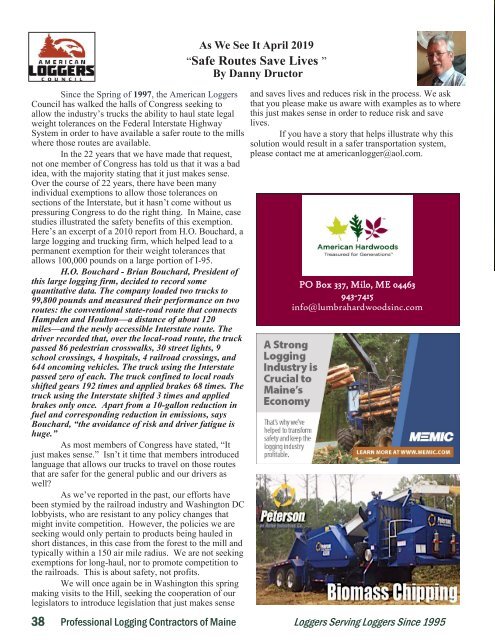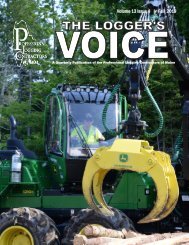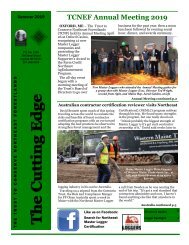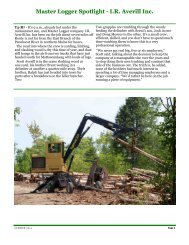PLC Loggers Voice Spring 2019
Create successful ePaper yourself
Turn your PDF publications into a flip-book with our unique Google optimized e-Paper software.
Since the <strong>Spring</strong> of 1997, the American <strong>Loggers</strong><br />
Council has walked the halls of Congress seeking to<br />
allow the industry’s trucks the ability to haul state legal<br />
weight tolerances on the Federal Interstate Highway<br />
System in order to have available a safer route to the mills<br />
where those routes are available.<br />
In the 22 years that we have made that request,<br />
not one member of Congress has told us that it was a bad<br />
idea, with the majority stating that it just makes sense.<br />
Over the course of 22 years, there have been many<br />
individual exemptions to allow those tolerances on<br />
sections of the Interstate, but it hasn’t come without us<br />
pressuring Congress to do the right thing. In Maine, case<br />
studies illustrated the safety benefits of this exemption.<br />
Here’s an excerpt of a 2010 report from H.O. Bouchard, a<br />
large logging and trucking firm, which helped lead to a<br />
permanent exemption for their weight tolerances that<br />
allows 100,000 pounds on a large portion of I-95.<br />
H.O. Bouchard - Brian Bouchard, President of<br />
this large logging firm, decided to record some<br />
quantitative data. The company loaded two trucks to<br />
99,800 pounds and measured their performance on two<br />
routes: the conventional state-road route that connects<br />
Hampden and Houlton—a distance of about 120<br />
miles—and the newly accessible Interstate route. The<br />
driver recorded that, over the local-road route, the truck<br />
passed 86 pedestrian crosswalks, 30 street lights, 9<br />
school crossings, 4 hospitals, 4 railroad crossings, and<br />
644 oncoming vehicles. The truck using the Interstate<br />
passed zero of each. The truck confined to local roads<br />
shifted gears 192 times and applied brakes 68 times. The<br />
truck using the Interstate shifted 3 times and applied<br />
brakes only once. Apart from a 10-gallon reduction in<br />
fuel and corresponding reduction in emissions, says<br />
Bouchard, “the avoidance of risk and driver fatigue is<br />
huge.”<br />
As most members of Congress have stated, “It<br />
just makes sense.” Isn’t it time that members introduced<br />
language that allows our trucks to travel on those routes<br />
that are safer for the general public and our drivers as<br />
well?<br />
As we’ve reported in the past, our efforts have<br />
been stymied by the railroad industry and Washington DC<br />
lobbyists, who are resistant to any policy changes that<br />
might invite competition. However, the policies we are<br />
seeking would only pertain to products being hauled in<br />
short distances, in this case from the forest to the mill and<br />
typically within a 150 air mile radius. We are not seeking<br />
exemptions for long-haul, nor to promote competition to<br />
the railroads. This is about safety, not profits.<br />
We will once again be in Washington this spring<br />
making visits to the Hill, seeking the cooperation of our<br />
legislators to introduce legislation that just makes sense<br />
As We See It April <strong>2019</strong><br />
“Safe Routes Save Lives ”<br />
By Danny Dructor<br />
and saves lives and reduces risk in the process. We ask<br />
that you please make us aware with examples as to where<br />
this just makes sense in order to reduce risk and save<br />
lives.<br />
If you have a story that helps illustrate why this<br />
solution would result in a safer transportation system,<br />
please contact me at americanlogger@aol.com.<br />
PO Box 337, Milo, ME 04463<br />
943-7415<br />
info@lumbrahardwoodsinc.com<br />
38 Professional Logging Contractors of Maine <strong>Loggers</strong> Serving <strong>Loggers</strong> Since 1995


















